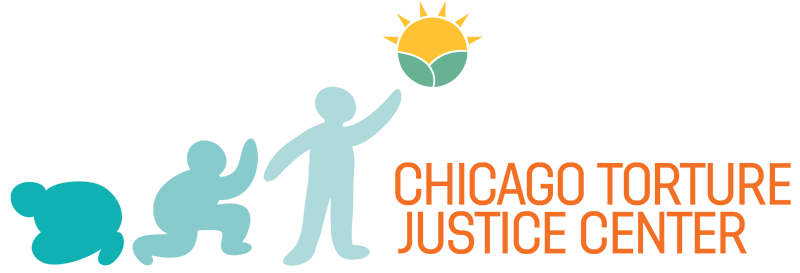Learning About the Mental Health Movement
Before it became home to the Chicago Torture Justice Center, 6337 S. Woodlawn served as the Woodlawn Mental Health Clinic until its closure in 2012.
A banner displaying the words: “Stop stealing our healing, save our clinics!” This photo was taken in the lot across the street from the Woodlawn Mental Health Clinic in 2012 during the campaign to save public mental health clinics. Photo by Sarah-ji.
In many ways, the Woodlawn Mental Health Clinic was the epicenter of the community-led resistance to the closure of half of the city's public mental health care centers by Rahm Emanuel in 2012. A coalition of organizations, mental health practitioners, patients, and community members led an occupation both inside and outside of the Woodlawn clinic in an attempt to save the centers slated to close. One of these organizations was Southside Together Organizing for Power (STOP). On May 18—a decade now since the community-led occupation to save the clinic first began—we invited STOP co-founder Matt Ginsberge-Jaeckle to the Center to share his experience of being on the frontlines at that time. Matt shared how the coalition formed an encampment, slept in an abandoned lot across the street, and held daily rallies demanding support for public mental health services in the city. We learned that long-time patients of the clinic, no longer able to receive services during this time, joined and linked arms with organizers to save their clinic. They voiced concerns about losing life-giving services or being forced to make long commutes in order to receive similar care.
Matt Ginsberge-Jaeckle speaking with a group of CTJC staff and community members outside of the former Woodlawn Mental Health Clinic on May 18, 2022
Their concerns became reality when former mayor Rahm Emanuel made the move to close half of the city’s mental health clinics, despite months of unwavering and persistent community pushback.
While this loss was and still is difficult for many, especially for those left without accessible mental health care, Matt reminded us that the mental health movement continues to organize for the expansion of public mental health care in Chicago.
The Collaborative for Community Wellness is a coalition of dozens of organizations citywide, including CTJC and STOP, pushing forward the Treatment Not Trauma campaign. Treatment Not Trauma “seeks to create a 24-hour crisis response hotline for mental health-related emergencies and to reopen Chicago's shuttered mental health clinics.”
We hope that one day, our neighborhoods and communities have access to the care we know we need.



